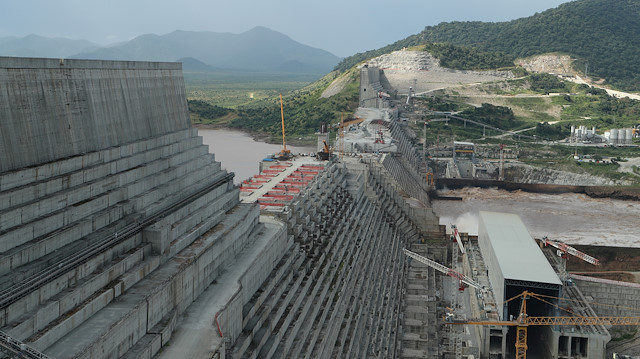
Foreign minister briefs resident ambassadors on ongoing construction and plan to fill $5B dam on Nile
Ethiopia on Monday briefed resident ambassadors of European countries and Americas about the Grand Ethiopian Renaissance Dam (GERD) under construction on the Nile River and latest developments in the technical, political and diplomatic developments surrounding the hydro dam.
The briefing was held by Foreign Minister Gedu Andargachew and Gedeon Asfaw, an engineer member of Ethiopia’s negotiating team.
Tensions have escalated between Egypt and Ethiopia after the former complained to the United Nations Security Council on May 1 after Ethiopia announced its plan to begin first-phase filling of its $5billion hydro dam on the Nile.
Ethiopia countered the complaint saying it was not obliged to inform Egypt on the issue as it was provided in a 2015 Declaration of Principles signed between Sudan, Egypt and Ethiopia. According to the declaration, negotiations on the GERD will be done in parallel with construction of the dam.
Ethiopia hopes to retain 4.9 billion cubic meters of water during this coming rainy season (July and August) as part of first-phase filling and the volume would be enough to test two turbines in mid-2021.
Last week, a Sudanese proposal to return to the negotiating table was accepted by both Ethiopia and Egypt but it is not clear if it would be mediated. The US-sponsored talks broke down in February after Ethiopia accused the US of openly siding with Egypt.
“The GERD project has entered its decisive phase of electricity generation,” Gedu told the ambassadors. “The project was launched in 2011 and being constructed with entirely local funding.”
He also told the ambassadors that Ethiopia pursued the principle of equitable and reasonable utilization of the Nile River and GERD would not inflict any significant harm on downstream countries, but rather bring a number of benefits, including regulation of the flow of water, prevention of flooding and evaporation, and providing a regional power interconnection.
Egypt keeps on expressing fears that the dam would reduce the flow of water reaching into its boundaries, while Ethiopia maintains it needs energy for development.
Ethiopia launched the GERD project in 2011 at a site 25 kilometers (15.5 miles) from the border with Sudan.
“Ethiopia supports the statements issued by the United Nations Secretary General and the African Union Commission Chairperson in connection with the dam,” Gedu said.
Discussion was held between the ambassadors and the Ethiopian side on the role the African Union will have to play concerning talks between Ethiopia, Sudan and Egypt.
Hello, the comments you share on our site are a valuable resource for other users. Please respect other users and different opinions. Do not use rude, offensive, derogatory, or discriminatory language.
The floor is all yours.








